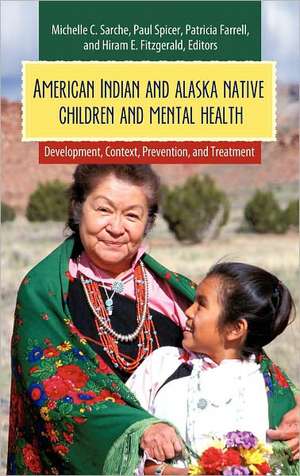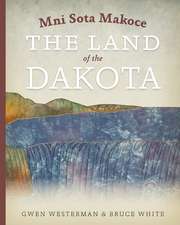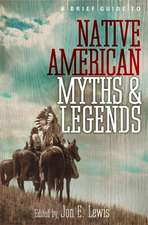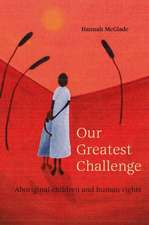American Indian and Alaska Native Children and Mental Health: Development, Context, Prevention, and Treatment: Child Psychology and Mental Health
Editat de Paul Spicer, Patricia Farrell, Michelle C. Sarche, Hiram E. Fitzgeralden Limba Engleză Hardback – 21 sep 2011 – vârsta până la 17 ani
Preț: 394.18 lei
Preț vechi: 482.49 lei
-18% Nou
Puncte Express: 591
Preț estimativ în valută:
75.44€ • 78.47$ • 62.28£
75.44€ • 78.47$ • 62.28£
Carte tipărită la comandă
Livrare economică 15-29 aprilie
Preluare comenzi: 021 569.72.76
Specificații
ISBN-13: 9780313383045
ISBN-10: 0313383049
Pagini: 424
Ilustrații: 40
Dimensiuni: 156 x 235 x 33 mm
Greutate: 0.74 kg
Ediția:New.
Editura: Bloomsbury Publishing
Colecția Praeger
Seria Child Psychology and Mental Health
Locul publicării:New York, United States
ISBN-10: 0313383049
Pagini: 424
Ilustrații: 40
Dimensiuni: 156 x 235 x 33 mm
Greutate: 0.74 kg
Ediția:New.
Editura: Bloomsbury Publishing
Colecția Praeger
Seria Child Psychology and Mental Health
Locul publicării:New York, United States
Caracteristici
Includes both a subject and author index to facilitate further research
Notă biografică
Michelle C. Sarche is assistant professor at the Colorado School of Public Health at the University of Colorado, Denver, CO; a clinical psychologist; and a tribal member of the Lac Courte Oreilles Band of Ojibwe.Paul Spicer is professor of anthropology and faculty at the Center for Applied Social Research at The University of Oklahoma, Norman, OK; member of the board of ZERO TO THREE, a nonprofit organization dedicated to infants and toddlers; and codirector of the American Indian and Alaska Native Head Start Research Center.Patricia Farrell is assistant provost of University-Community Partnerships in the Office of University Outreach and Engagement at Michigan State University, East Lansing, MI; and is an enrolled member of Taos Pueblo.Hiram E. Fitzgerald is series editor for the Praeger series, Child Psychology and Mental Health. He is associate provost for University Outreach and Engagement and University Distinguished Professor of Psychology at Michigan State University, East Lansing, MI; and adjunct professor of psychiatry at the University of Michigan, Ann Arbor, MI.
Cuprins
Series ForewordHiram E. FitzgeraldPrefaceHiram E. Fitzgerald1. Historical Trauma and Native American Child Development and Mental Health: An OverviewChristopher D. Campbell and Tessa Evans-Campbell2. American Indian and Alaska Native Children and Families: Social and Economic ConditionsMatthew Snipp and Anjula Saraff3. American Indian and Alaska Native Grandfamilies: The Impact on Child DevelopmentSuzanne Cross, Angelique Day, and Patricia Farrell4. American Indian and Alaska Native Students with Disabilities: Implications for Research and PracticeSusan C. Faircloth5. Learning the Community's Curriculum: The Linguistic, Social, and Cultural Resources of American Indian and Alaska Native ChildrenMary Eunice Romero-Little6. Ethnic Identity and Mental Health among American Indian and Alaska Native AdolescentsCarol A. Markstrom, Nancy Whitesell, and Renee V. Galliher7. The Emergence of Problems in Adolescence for American Indian and Alaska Native ChildrenAmy E. West and Denise L. Newman8. Intragenerational and Intergenerational Implications of American Indian Children's Mental Health: The Place for Adult DevelopmentKaren Albright9. Community-Based Participatory Research in Indian Country: Definitions, Theory, Rationale, Examples, and PrinciplesLisa Rey Thomas, Dennis M. Donovan, Robin Little Wing Sigo, and Laura Price10. Systems of Mental Health Care for American Indian and Alaska Native Children and AdolescentsDouglas K. Novins and Gary Bess11. Community-Based Interventions for Depression in Parents and Other Caregivers on a Northern Plains Native American ReservationJoshua Sparrow, Minnetta Ironpipe Armstrong, Carol Bird, Ethyl Grant, Sherry Hilleboe, Brenda Olson-Bird, Renee Tatsey, Sharon Wagner, Margaret Ann Yellow Kidney, and William Beardslee12. The Prevention of Fetal Alcohol Spectrum Disorders in Tribal CommunitiesMichelle C. Sarche, Candace Fleming, and Paul Spicer13. Culturally Based Education: Promoting Academic Success and the General Well-Being of Native American StudentsWilliam G. Demmert Jr.14. The Indian Child Welfare Act: Implications for American Indian and Alaska Native Children, Families, and CommunitiesMatthew L. M. Fletcher15. The Process and Dissemination of Cultural Adaptations of Evidence-Based Practices for American Indian and Alaska Native Children and Their FamiliesDolores Subia BigFoot16. American Indian Life Skills: A Community-Based Intervention for Indigenous Mental HealthTeresa D. LaFromboise and Azadeh S. Fatemi17. Cultural Interventions for American Indian and Alaska Native Youth: The Elluam Tungiinun and Nagi Kicopi ProgramsJames Allen, Gerald V. Mohatt, Stacy M. Rasmus, Rick Two Dogs, Tara Ford, Ethleen Iron Cloud Two Dogs, and Richard Moves CampIndexAbout the Editors and Contributors
Recenzii
This work, part of the Child Psychology and Mental Health series, is an important addition to the literature regarding American Indian/Alaska Native (AI/AN) health and health care. . . . This book belongs in the library of any college with programs in Native studies and/or health programs to prepare care providers to effectively meet the needs of AI/AN clients. Highly recommended.
In this work, we now have a psychology book about American Indian and Alaska Native children that edifies us with its depths as well as with its particular Native points of view. . . . Further, its topics are wielded into a corpus of interdependent material elegantly bound together into an organic whole. . . . As I finished this book, I considered that more work in this area is needed. Such a thought is a compliment. Good writing always leads to more writing.
In this work, we now have a psychology book about American Indian and Alaska Native children that edifies us with its depths as well as with its particular Native points of view. . . . Further, its topics are wielded into a corpus of interdependent material elegantly bound together into an organic whole. . . . As I finished this book, I considered that more work in this area is needed. Such a thought is a compliment. Good writing always leads to more writing.




![African American Children and Mental Health: [2 volumes]](https://i2.books-express.ro/bs/9780313383021/african-american-children-and-mental-health.jpg)
![Obesity in Childhood and Adolescence: [2 volumes]](https://i3.books-express.ro/bs/9781440858536/obesity-in-childhood-and-adolescence.jpg)










